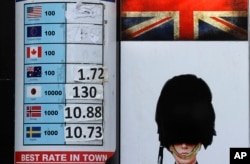The British pound has fallen sharply over the past two weeks, and is now at record lows against the U.S. dollar, losing around 20 percent of its value since Britain’s vote to leave the European Union.
Analysts say the realization that Britain could be headed for a so-called ‘hard Brexit’ – likely to involve leaving the European Union’s Single Market – has triggered a major sell-off. But the fall in value provides opportunities for foreign visitors.
For a short time this week, a thick black spread called Marmite – a British breakfast-time favorite - became the unlikely first victim of the plunging pound.
Its maker, the giant multinational Unilever, says the drop has forced up import costs, which it wants to pass on to retailers.
Tesco, Britain’s biggest supermarket, refused. So Marmite and several other Unilever products began disappearing from its shelves.
The dispute was resolved, but currency analyst Kathleen Brooks of Gain Capital in London says it shows that Brexit is starting to bite.
“Yes, Marmite might be packaged in the UK or put together in the UK, but all of the individual ingredients, even things like the glass, where the label comes from, that’s all from abroad so they’re having to pay in foreign currency for that, yet they can only sell it in pounds,” she said.
Erosion of living standard feared
Ultimately, Brooks says it’s consumers who will likely pay for a plunging currency.
“It’s becoming clear that the market does not think that the outcome of Brexit and the impact of Brexit is going to be good news for the economy. And a shrinking UK economy means a weaker pound. This is going to erode standards of living here in the UK, because these are consumer goods,” Brooks said.
But some industries are benefiting. Tourism is booming as foreign visitors find themselves with more pounds in their pockets – like Derek Hotter from New York.
"Now you come over here knowing it's so much better in our favor, you feel like you can shop a little bit more," Hotter said.
The former head of the Bank of England Mervyn King says Brexit is achieving what policymakers couldn’t.
“During the referendum campaign, someone said ‘the real danger of Brexit is that we’ll end up with higher interest rates, lower house prices, and a lower exchange rate.’ And I thought ‘dream on.’ Because that’s what we’ve been trying to achieve for the past three years. And now we have a chance of getting there,” King said.
But the falling pound means pain at the checkout. Most analysts say the pound has further to fall – and expect inflation to rise rapidly.













